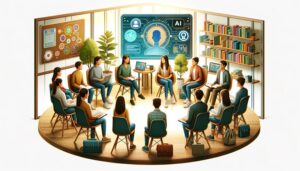When I first came across this video from the online knowledge forum Big Think, I really didn’t know what to expect. Looking at the subtitle “Start Breaking Some Rules” I was a little apprehensive since I’ve always thought encouraging adolescents to break rules is equivalent to a classroom death sentence. My intrigue overcame suspicion and I watched it anyway.
Wow, I’m glad I did.
In the video we learn of the ‘crucible’, a high-pressure 56-hour obstacle course given to marines during boot camp in which they are placed in physically and mentally grueling situations. In one situation recruits are in a sand pit having to move ropes and logs. They are told to wait for orders from their superiors before doing anything. But because they and their superiors are wearing gas masks, recruits are rendered powerless to hear and follow the commands of their officers. They quickly realize they must devise their own path of action relying only on their instinctive judgments. The goal of this training is to cultivate what the trainers call an “internal locus of control,” whereby the marine is motivated to act without direction from others.
This is counter-intuitive to me.
I had always assumed that marines are motivated by being told what to do and following orders. But here recruits are taught to resist the impulse to follow orders. The underlying psychology here is fascinating: when people are put in positions to break from traditional patterns of thinking, their engines of self-motivation kick into gear and they learn to act with independence and confidence, skills- which for a soldier are indispensable in the chaotic and unpredictable world of warfare.
It got me thinking. How could I translate this lesson on self-motivation into my own classroom with my students?

Well, I don’t have obstacle courses.
But I can ask Essential Questions:
Essential questions reveal different perspectives and welcome confusion over a topic. This confusion disrupts thinking and necessitates that students assume the responsibility of crafting their own path to find answers. In this way, like the marines, the students are inspired to cultivate an internal locus of control, which is the seed of self-motivation.
Here’s how this might play out in a government class with the essential question: “Is popular sovereignty a reality or an illusion?” No clear answer here. The students must design their own thinking rules for how to answer it and each student has some important decisions to make:
Should I focus on interest groups or leave them out?
Should I focus my analysis on Congress, the presidency or the courts, or maybe a little bit of each?
Should I limit my analysis to the branches of government or expand the analysis to include how people participate through protest?
Now think back to the essential questions from previous posts and consider how they might similarly encourage independent decision-making.
Can intolerance be a virtue?
How can you protect your freedoms without limiting someone else’s?
Is America the Land of Opportunity?
Ultimately, we know what the students will do with essential questions, at least initially. Ask the teacher! But here is where as teachers we must resist giving them orders on how to think about the question. The more we do that, the more students become dependent on us and the less they rely on their own instincts. Yes, the students are in for a struggle to be sure, but like the marines they will emerge from these classroom crucibles with heightened capacities for self-motivation and renewed courage to think for themselves. These skills have inestimable value.
What essential questions do you think would best inspire students to develop an “internal locus of control”?





